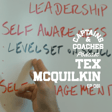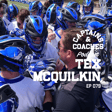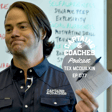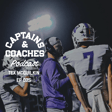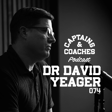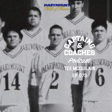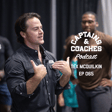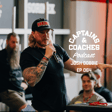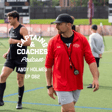Introduction and Jim's Journey
00:00:00
Speaker
If we don't pick up a first down, you walk to the sideline and you either get chewed out or potentially even worse, they don't even want to talk to you. yeah No eye contact.
00:00:10
Speaker
So all of a sudden you start to subconsciously develop this purely behaviorist version, like this this place that was so powerful and meaningful. Seems like it might only be interested in what I can do for it or them or what have you.
00:00:25
Speaker
So you develop this faulty feedback loop. yeah This value that I was just feeling is dependent on how I play. And then if I don't play well, the questions start to come back up. Welcome to the Captains and Coaches podcast where explore the art and the science of leadership through the lens of athletics and beyond.
00:00:42
Speaker
I'm your host Tex Wilkin and today we travel to New Orleans for the and NSCA Coaches Conference to sit down with Jim Davis, founder of the Good Athlete Project and a pioneering force in the social, emotional learning within athletics through his Beyond Strength journal.
00:00:57
Speaker
From building one of the largest high school strength programs in the country, to developing character-driven leaders worldwide, Jim's approach transcends traditional coaching paradigms.
00:01:08
Speaker
In this powerful conversation, we dive deep into how coaches can shape not just good athletes, but more self-aware, resilient human beings. Whether you're a coach or a team leader seeking to create lasting impact, This episode will challenge you to think differently about behavior, purpose, and the true meaning of athlete development.
The Impact of Social-Emotional Learning
00:01:30
Speaker
let's hand it off to Jim. Ready, ready, and break.
00:01:36
Speaker
We are thrilled to be here. We are thrilled to be here. We are grateful to be here as well. Very grateful to here. And I'm here with Jim Davis. How are you, Texas? At an undisclosed location.
00:01:48
Speaker
True. Very true. We can't say anything about it. Or a guy who will not be named will have our backs for it. We are at the NSCA Coaches Conference in New Orleans. That much we can say. You ping me with a text and I'm like...
00:02:05
Speaker
Yes, I will be here. And got lock you down for a podcast because I love it i would have loved for you to have been my first guest on this whole venture that is the Captains and Coaches podcast.
00:02:17
Speaker
I love that, man. i appreciate it Yeah, dude. And it was a conversation that we had two years ago, also at and NSCA Coaches Conference. Or maybe it was three years ago. think it was 2001 or 21. San Antonio? It must have been three. San Antonio?
00:02:31
Speaker
must have been three san antonio
00:02:35
Speaker
Could have way back. yeah We've been to a few of these together. I know. But recording a podcast. and yeah Oh, that's right. yeah that's right In and another undisclosed location. Correct. And then you dropped a phrase, and this is the the the first time that I ever heard it, but social emotional learning.
00:02:53
Speaker
That was the first time. That was the first time. And that, at least that it it
Leadership Development in Sports
00:02:58
Speaker
sunk in. Maybe viewing your presentations in the past and conversations, but when it, ah the seed was planted.
00:03:04
Speaker
And then aiming to just listen to what you had to say with that and then starting to have light bulbs go off within my coaching of high schoolers and then, i mean, exploring it and really researching and understanding and then seeing the growth and development with with my year with KidStrong and just the like the true representation of this.
00:03:29
Speaker
so much value and you understand it better than anybody. So, I mean, give us, speak to us briefly on your resume, your experience as a leader, and then where you came to this term of social emotional learning.
00:03:45
Speaker
First of all, your thoughtfulness has always impressed me. And I mean that, and I'm glad we have a format to say that out loud. I mean that. So I'm glad that that concept resonated with you. And I'm impressed but not surprised by the work ethic that has followed, that you've really gone down that rabbit hole to figure it out.
00:04:03
Speaker
So thank you for that. um My leadership resume.
00:04:09
Speaker
I've done a lot of things, Tex. I know. So I don't know where it started. I think in a cheesy way, i went from the the chubby new kid in town to captain of my high school football team, and that was a really important developmental journey for me.
00:04:23
Speaker
I went on to pursue football for a while. I played professional football. I played in college, and I played you know arena football and or indoor football, and and then played over Europe for a few seasons. And the obvious leadership opportunities that come from playing sport were apparent there.
00:04:39
Speaker
Professionally, it probably first started to manifest also on a football field, so sort of an organic transition from player to coach. Maybe more importantly, then found its way into the weight room, which we can discuss today.
00:04:53
Speaker
So for the last, this is hard to believe, like yeah I just got the E status emeritus from the NSCA. I'm just distinguished. 20 years. had to start right away to make it happen. I literally...
00:05:07
Speaker
It was my first gig. Anyway, so it it found its way into the weight room. We grew a program at Nutrier High School. Absolutely amazing place on the north side of Chicago.
00:05:18
Speaker
Nutrier went from
Global Reach of the Good Athlete Project
00:05:19
Speaker
a very good place with very good people and dedicated coaches to all of a sudden we had a strength program, about 80 people strong.
00:05:29
Speaker
We now serve more than 2,000 visits a week. We're, if I'm not mistaken, the largest strength conditioning program that exists, and at least in terms of how many visits to our space. And the development of that was my first foray into leadership because, as you can imagine, with that many kids, it couldn't just be one person pulling the strings, micromanaging during the show, we had to really develop a set of leaders to then go lead these groups that I could no longer have such direct touch points with. That was a big one. So professional development at Nutriere became, that that was like the first real big one.
00:06:02
Speaker
Once that sort of caught fire, and started rolling, i I was like, this is too good to save just for our space. So we started in my second round of grad school. We started a nonprofit organization called the Good Athlete Project.
00:06:16
Speaker
And it's been incredibly meaningful. And that has allowed us to take the work we've done at Nutrier in part, or a lot of the lessons we learned there, and spread them all around the world. so we've been down to Haiti a couple times, east coast to west coast, top to bottom of the country.
00:06:31
Speaker
We got back from Ireland not long ago. We're really trying to pick it up and and share it as much as we can. So that was big. But then also, and I don't know, you said short, so I'll try. ah We just keep finding ways where, like, if it works, we must pass it
Applying SEL Beyond Youth Sports
00:06:45
Speaker
on. We're sort of like, we're very ethically driven by that. Pay it forward is a very real concept.
00:06:49
Speaker
um So we started Illinois High School Powerlifting Association 10 years ago at this point. It continues to be one of the faster growing sports within the state of Illinois.
00:07:00
Speaker
We have a bunch of teams, hundreds of kids, if not thousands at this point, powerlifting as a sport. And then more recently, it has transcended into the corporate realm.
00:07:13
Speaker
So I do a lot of one-on-one engagements, what people might call executive coaching, but I also do a lot of professional development sessions. And it is amazing, and you probably can already guess this, but the lessons learned through the development of team culture apply almost universally.
00:07:29
Speaker
Different phrasing, different dynamics, you know different metaphorical or actual trophies, but it's just people working together for a shared outcome. So it's been pretty cool.
00:07:41
Speaker
That is an experience, and then you continue to learn, apply, and then which also leads to viewing gaps. So you're working with adults, you're working with high school yeah athletes, but then this whole SEL thing, it was all the research is done in elementary school.
00:07:58
Speaker
So where does that journey, you seeing limitations, gaps, different behaviors that negatively affect teams, connect back to social emotional learning as it's connected to elementary school development for that that age group. And you're right. I think i think a lot of the research does happen pretty young.
00:08:17
Speaker
but it is transformative at every level. And I would even say it's had some of the biggest impact in spaces where we talked about this before hitting record, that education gap is real and resonant and is playing out in unfortunate ways, meaning distress, stress, anxiety, overwhelm, tough relationships. It so just continued down the,
00:08:43
Speaker
continue down that rabbit hole. Like these things
The Role of Coaches in Athlete Development
00:08:47
Speaker
are presenting in adults almost, you know, all over the place. And, and the thing that kind of tugs at my heartstrings is that you don't know how to deal with it.
00:08:55
Speaker
Nope. And it is, man, um I just had like a wave of emotion just thinking about it because you find one of the worst things you can do. One of the worst places you can find yourself in is a stuck place ah where you start to see the issues, but you don't see the path forward necessarily.
00:09:15
Speaker
And that is that this education gap, social, emotional learning, healthy relationships, self-management, is is very real. And I think that's one of the reasons why this transition into more like executive coaching and and adult stuff has really landed with folks.
00:09:34
Speaker
I was worried going into that space that I would miss some of the real fulfillment that comes from working with young people and helping them get to a next place. Empowering young people is... It's good, but it also gives the deliverer of that experience a lot of fulfillment. At least that's been my experience.
00:09:51
Speaker
And I was worried that moving to the other other spaces wouldn't check that box in quite the same way. But it's been the opposite. The gratitude from people in their fifty s and 60s and... who just missed this and are so grateful to now have it has been exceptional.
00:10:05
Speaker
Yeah, and and and they're aware. So their their walls have come down, their shields have come down. And I feel maybe it's because they reached failures or they they had opportunities, relationships, there they they lost.
00:10:20
Speaker
But then something switched on for that self-awareness. So where i i love SEL for working with teenagers, I view the high school coach, you're the last line of defense before this kid enters into the real world.
00:10:33
Speaker
Professor, boss, where they're not going to put up with these excuses. So you as a coach, you have an opportunity to now, okay, well... We're going to teach self-awareness. We're going to help you understand purpose.
00:10:48
Speaker
With sports, purpose is very inherent, but now we can connect outside and tangible opportunities like the weight room to now your on-field play, where we just don't want to go through the motions in the weight room. We want to lift with intent, and that's going to translate to the field. and the the self-management and this is what i love special with lacrosse penalties are costly and so in spin football fifteen yards whatever but across we have to go man down so now right if i'm playing six on six or even but if i make a mistake is an individual now it's five on six and i just put my team in a very very poor position so that way it is it immediate
00:11:35
Speaker
like, okay, here's a consequence where in football it's, yeah, maybe I get barked at a little bit. I'm just giving you a hard time as football guy. I accept. As much as I love football and I truly do, I haven't coached for about five years and um and it's not sports specific, but all all realms have room to grow and football certainly is is one of them as far as I'm concerned.
00:11:58
Speaker
yeah Yeah, I'm with you 100%. I think, first of all, the purpose Sometimes I wonder if we do a good enough job teaching for purpose in those environments.
00:12:09
Speaker
I think what we do a great job of is teaching compliance for a very specific and almost rigid path toward a goal, which can be helpful, but it can also be really tricky. one of the you know We work with a lot of post-career athletes too.
00:12:23
Speaker
And there's this funny dilemma we're facing, which is the more invested you are in your sport, so the higher, you know and to reach the pinnacle, you've got to go all in. But the more invested you are, the steeper the cliff is on the other side.
Managing Emotions in Sports
00:12:38
Speaker
And part of the reason is You're so used to the rigor and clear directions of this environment and all of a sudden it doesn't exist.
00:12:48
Speaker
So when you said self-management, that is a skill. like Compliance is far different than self-management. Early on, there's a great window of opportunity to show how complying with team rules and regulations, which are appropriate and needed, and I am on every team I've ever coached, of course.
00:13:06
Speaker
But to explain the layers of it, like here's how the decision impacts the rest of us, opening up someone's awareness to does this decision that you're making, does it align with the goals that you have personally and that we have together instead of you did this wrong, run a lap, you did that, you know, which is different.
00:13:23
Speaker
Yeah, and and i I want emotion for my athletes, so that way we can now articulate and label them specifically. so So something that I aim to apply with them, this is from an a called author, his name is Bradshaw, but it's e-motion, energy in motion.
00:13:42
Speaker
Yeah. So now we get an opportunity. If you're angry, okay, well, I don't want you to use your stick as a weapon. I want you to turn that into an aggression, an intent, an urgency on the field.
00:13:53
Speaker
So yeah redirect it. I'm thinking, Waterboy, use it on the field. For sure. Water sucks. Yeah. and And helping them label this stuff, which i we've practiced five days a week.
00:14:05
Speaker
with some weight room time in there so now we get the amazing chance to to to feel, to fail, and then learn this stuff before it comes to game time.
00:14:16
Speaker
And then as coaches, we gotta model it. And you gotta model it. I love how you brought up labeling because that's that's one area that I think is a sticking point for some people. Learning character development, social-emotional learning, social-emotional leadership, can I say that? Well, I was gonna drop that bomb the layer, but hey, you got it. Pause it, edit.
00:14:37
Speaker
It's like you have to know what tools are at your disposal. Right. And so so the labeling I've bumped into folks who are like, this feels like too much and it might feel like too much. I'm not discounting that.
00:14:48
Speaker
But I do think it's a worthwhile endeavor to try to see what's going on, bring awareness to it and then develop a language so you can start to unbraid and distinguish complicated situations, including the very complicated situation that's going on between our ears at any given moment.
00:15:04
Speaker
So to be able to label it, to bring awareness to it, be able to label it, that sort of, you essentially have to soften back or slow down to see it and label it if you then want to progress. And I think one of the things that I've run into, you mentioned anger. One of the things that I've run into is this idea that in in arenas where everyone's so driven, which I like those spaces. I,
00:15:29
Speaker
I'm not pushing back on them, but in arenas where everyone is so driven toward ah an outcome and everyone's aiming for efficiency and speed. I think that's good with an asterisk because you don't create space to slow down, soften back, see it, name it, and then make a thoughtful step forward, you're just it's like toil.
00:15:48
Speaker
Endless work is toil. Work with a purpose is different. But if you don't create space to see it well, name what's going on, I think that's ultimately what creates so much anger.
00:15:59
Speaker
And I have a lot of, I have some stories, personal and otherwise, about that. but And I'll just share it. why not That's what we're doing here. I struggled with anger during the back end of my football career and transitioning into real life, for sure.
00:16:12
Speaker
And um the intensity that I think was sometimes helpful in football when I was an athlete
00:16:22
Speaker
I just did not have the tools at the time to name what was going on and navigate it well. So, so many emotions, if they go unnamed, bottle up and present eventually.
00:16:34
Speaker
So if you can't name the emotion you're having, like start at frustration. Start with the fact that you feel like one of your teammates slighted you or maybe your coach did whatever it might be. you don't see it, name it and ventilate the energy which is happening absolutely.
00:16:49
Speaker
but like Everyone knows what it feels like to be stressed out. like When you say, like how does it feel to be stressed out? You can talk about the emotional sensation, but you could probably identify some muscle tension and different feelings in the
Behavioral Challenges in Athletics
00:17:00
Speaker
If you don't ventilate that energy and you keep tamping it down, it will present eventually. And you have less control on the reins when it does, if so.
00:17:11
Speaker
Time out. Every so often I receive messages that remind me why we created the Old Bull program. Today I want to share Kevin's story with you. Not just because it showcases physical transformation, but because it represents what's possible when training evolves beyond just sets and reps.
00:17:29
Speaker
Kevin recently reached out with a message that captures the essence of what we're building. Here we go. Hey Tex, this is Kevin from Old Bull. Just wanted to shoot you a quick text to say I'm really digging the program and seeing great results.
00:17:42
Speaker
Made a few dietary tweaks, upped my protein for one, but through the training I've been seeing more muscle and strength gain with infinitely less pain in the process than probably any other point in my lifting career.
00:17:56
Speaker
I recently got together with some friends I hadn't seen in a couple years and every one of them made a comment about how they've never seen me looking bigger or stronger than I do now. Appreciate the program and what you're doing to make it excellent. Here's what really matters. This isn't about quick fixes or unsustainable programs.
00:18:15
Speaker
Old Bull engineered for the experienced lifter who values longevity as much as they do intensity. We're talking about intelligent progression that respects your body signal while constantly pushing your boundaries.
00:18:29
Speaker
If you're ready to transform your training into something more sustainable, more intelligent, and ultimately more impactful, the Old Bull program is your path forward.
00:18:40
Speaker
Click the link in the show notes and take control of your strength journey today. Yeah. That happened to me a lot, unfortunately. My my big tackling to to use a football bond here is just shame. Love So if yeah if I was getting a a direction or an emotion from somebody else, ah internalizing it and then being silent.
00:19:01
Speaker
So that way, okay, well, I'm just going to fight harder. I'm going be perfect. All this without communicating and and being silent. And a yeah, eventually just collapses all in itself.
00:19:13
Speaker
You know one of the trickiest? First of all, I'm sorry that you had that experience. Well, that's why we're using the podcast. And that's why we're here. It's cathartic. Dude, and that's why we're here. one hundred percent 100%. So I think one of the trickiest things to recognize about my athletics career, my football career specifically,
00:19:33
Speaker
which served me so well. I love it. I don't think i would change. i mean, it made me who I am. I'm very grateful. Lots of great relationships. Thankfully, I was in the presence primarily, yeah mostly with great coaches. So I was, I felt a good hand in that way.
00:19:48
Speaker
One of the trickiest things that i recognized was there was a point in my life when I moved from the city of Chicago to the suburbs. played full padded football for the first time. And this was like, I wanted so badly to be part of this thing that was like a family tradition on both sides of my family.
00:20:03
Speaker
I want so badly to be part of it. And then I found it and i didn't have immediate success, but I worked towards success and there's some lessons to be learned in that. But the point of this story is one of the things I found in that space was really powerful mentorship.
00:20:19
Speaker
and adults who were willing to put their arm around me and and compliment me and and give me some of the support that i I think I was looking for at that time, which is great.
00:20:32
Speaker
Take one step forward though, it was at its best when the team was doing well. And this is not to poke holes in any of the great coaching I was very lucky to have experienced, but If we would score touchdown, these mentors now in my life, these powerful figures in my life, we're thrilled.
00:20:50
Speaker
Hugs, high fives, the whole deal. If we don't pick up a first down, you walk to the sideline and you either get chewed out or potentially even worse, they don't even want to talk to you. yeah No eye contact.
00:21:03
Speaker
So all of a sudden you start to subconsciously develop this purely behaviorist version, like this this place that was so powerful and meaningful. Seems like it might only be interested in what I can do for it or them or what have you.
00:21:18
Speaker
So you develop this faulty feedback loop. Yeah. This value that I was just feeling is dependent on how I play. And then if I don't play well, the questions start to come back up.
00:21:29
Speaker
Guilt and shame are rampant in sports, whether people are willing to say that or not. Yeah. My experience was zero positive. Really? Only negative. So if you did well, then that's what you're supposed to do.
00:21:42
Speaker
Yeah. That's the way it is. That's what you're supposed to do That's right. There is no good job. There is no acknowledgement. There is no... ah external earshot praise. There's no standing up for you.
00:21:54
Speaker
It's, it was only only negative. So then guess that's where the shame comes in because now you internalize and your perception of yourself is x Y, Z. And that every option for yourself is, is worthless, is negative.
00:22:10
Speaker
Well, I am this. I'm either perfect or I screwed up. And there's, and there, yeah. Yeah. And then when, yeah, especially when it wasn't perfect yeah or it was perfect, but you are so confident and feel good.
00:22:24
Speaker
And guess what? The goalpost moved and you weren't told. Right. And now u are MF'd and you are taking it. Yeah. So that, and how old were you when that happened?
00:22:37
Speaker
Uh, I can 16 to 36. Yeah, most of your yeah conscious lifetime. Yeah, conscious lifetime. I seem to find myself into these roles that are ah unappreciated, undervalued, defensive midi within the lacrosse field, yeah you know a JV superstar, and then work environments.
00:22:59
Speaker
But, hey. Well, one one thing that you've developed, and I know this – might be in line with what we want to talk about too is is the concept of override. Okay. Sorry if I open that one up? Yeah.
00:23:11
Speaker
So override is one of most common things I see in post-career athletes. And override essentially would be the ability, and I do think it's an ability, to just override whatever the inputs are and keep plugging forward.
00:23:24
Speaker
And if you are banged up in the fourth quarter of a football game and you have to pick up the first down anyway, that can be a real superpower. So there's a place for that.
Character and Community in Coaching
00:23:32
Speaker
I think what I see happen, and I experienced this myself, and it sounds like maybe you have as as well to some degree, is you become good at taking lumps.
00:23:42
Speaker
And you've got a lot of endurance. And you you can override if called upon. And then instead of it being selective override where you're choosing to tag in this superpower – yeah it moves to a place what we call default override.
00:23:57
Speaker
So instead of it being something you decided to do because the game was on the line and you were gonna put that purpose above your own pain, you start to tune out the inputs that are suggesting in any given environment that something might be off.
00:24:11
Speaker
Inputs of pain, inputs of discomfort, inputs of not feeling seen or valued. And like you can get past them. You can get past them, but we've just sort of built these default dispositions where we don't even slow down to see them for long enough to say, is this actually what I want?
00:24:28
Speaker
No. So in in an aim for helping build self-awareness for coaches, yeah what are what are some ways that we can help them shift their focus beyond performance to prioritize character, community?
00:24:43
Speaker
boundaries and establishing these lessons that they can then carry into their next endeavor, whether it's whether it's college, college athletics, trades, school, et cetera, relationships.
00:24:57
Speaker
That's it. you Yeah. There's a lot in that question for sure. I like i can go to methods, some methods and the things that we do for sure. But I think one There are a few easy, i think, mindset inputs when it comes to the language that we try to give to coaches. The first is the one that you've heard many times, which is the mantra of practical mindfulness we call oi is what we call it.
00:25:20
Speaker
It's does your behavior match your goal? So I think a coach should be tasked with saying, this is the sort of human, this is sort of person I would like to see as they step away from our program.
00:25:33
Speaker
I think they should be tasked to say that, in part because yeah I've sat in on interview committees, so many people will say upon interviewing, We're teaching life lessons. I want this person to be a good father, a good member of the community and all those things. And they probably mean it, but unless you get really specific, didn't yeah to at least kind of specific on what sort of person that might look like. What's the profile of the person who can then who can walk into the community, walk into college, trade, real life?
00:26:02
Speaker
and be set to go. if If you're teaching something, we call them for now lessons or forever lessons. If it's not a forever lesson, then you're not teaching life lessons. and And by the way, I'm not even suggesting that everyone has to.
00:26:15
Speaker
I think you could because sports is maybe the most powerful learning environment on the planet. But I think it takes a thoughtful coach who actually does want the best for their players to be able to say ah some of these things are for now lessons. And those are appropriate at certain times.
00:26:33
Speaker
But we have to have some forever lessons. Otherwise, we're not coaching for life lessons and we can't keep pretending. So I think it would then move to creating that profile.
00:26:44
Speaker
here Does your behavior match your goal is a mantra that just brings intention into mind. Like what are my intentions here? Something I probably could have used more of as an early coach.
00:26:55
Speaker
Probably all early coaches. That's why we're here. Again, we're paying it forward. So if you pick a few character traits or some things that would be backed by the research in social emotional learning,
00:27:07
Speaker
I don't know why you wouldn't pick things like growth mindset, which people, if you explain to people what growth mindset is, take it out of whatever preconception they may have of social emotional learning which I admit sometimes can sound potentially soft.
00:27:23
Speaker
You say, I want a growth mindset. What does that mean? It means i want to be able to engage with challenges and believe in my ability to overcome them, to adapt, improvise, overcome the challenge that's ahead of me.
00:27:35
Speaker
thank you Of course we want to instill that in people, you'd think. There's ways to do it. Grit is something that's been semi-controversial in the social-emotional learning landscape. But grit in its definition is passion and perseverance for long-term goals. Like who wouldn't want that?
00:27:51
Speaker
In fact, grit, just a side note, has ah has proven to be a pretty good buffer for downstream mental health concerns.
Instilling Social-Emotional Traits
00:27:59
Speaker
So if you're gonna teach something that's good now and good later, something can get us results in the fourth quarter of a game or and and or support someone for life, that's a pretty good one to onboard.
00:28:11
Speaker
You want some methods here or what do you think? Yeah, lay it on me. You know, and those are only two. We could go down the full laundry list. But if you if you think about what social emotional learning really is, self-awareness, self-management, grit gratitude, growth, resilience, empathy.
00:28:29
Speaker
People balk at the idea of empathy. Well, like but taking the perspective of another or trying to, trying to be into like, anyway, these are all good things. They work in the moment and they work for life.
00:28:40
Speaker
I think so much of this is about getting clear on intentions. And once you are, and that's why there's no script for this. It's mostly conceptual. There's no script because the task for a coach is to bring it to life in their own environment.
00:28:53
Speaker
The way we do it is once we know what we want and we're clear as coaches about what we want, we find that there are opportunities for it all over the place, every day, with every group we work with.
00:29:04
Speaker
Probably the most intense example is and most explicit is when we work with power lifters. A truly wonderful but blue collar and meat headed group.
00:29:15
Speaker
Great, it's great. It's like let's just pick up as much weight as we can. what Great, let's make that a sport. So what we'll do, we'll be in front of a room, you know, when we host the state championship for powerlifting, say, in Illinois.
00:29:28
Speaker
We'll have legitimately hundreds of kids representing 30-plus schools across the state. And we will make time at the end of every event. We'll stop the whole event. And literally, you can I'm sure we've got film of it. If someone's on their phone in the back, we ask them to put it away.
00:29:42
Speaker
The message here is important. And we ask people to think, just reflect on what they've just done. So say we we complete the squat event. So we're at the end of the squats and we'd say something like, go back to that moment.
00:29:57
Speaker
Think about how hard that was, a max effort squat. You're in the bottom of a squat. It couldn't be harder. it's as little It's a max effort. It's as heavy as you can possibly go. It's going to take all of you to even nudge that thing back in the other direction.
00:30:10
Speaker
And every one of you at least tried. You at least went for it. lot of you are successful, but all of you at least went for it. In a moment where like as much as you could handle was on your back, you at least went for it.
00:30:24
Speaker
And we ask them not only to get into the moment, get back into the moment, we then ask them to name it. And truthfully, whether whether they call it grit or resilience or toughness or whatever might be, they just have to put a label on it.
00:30:35
Speaker
yeah we We talk about that as like that that's packing their suitcase. So you've you've been there, you've done it, you've felt it, you've named it. Now you have the opportunity to carry this forward with you.
00:30:47
Speaker
And then we ask them just for a second to picture where this might come into play. We got finals coming up. You might need a little bit of grit or resilience to get through that. So it's reflection, naming, and projection.
00:31:01
Speaker
I love it. And we sort are sort of priming the use of it in future events. Yeah, I'll find a way to work that into into the season. ah One thing that I've been very deliberate and intentional with is bringing up negative emotions as well.
00:31:18
Speaker
So where yeah years, 15 years of coaching, I was so focused on positive, almost to the point ignoring the negative. And I found just, I felt that wasn't effectively preparing them for the next level, whatever that was for my guys.
00:31:35
Speaker
So now it's it's naming and acknowledging teen killers, can't like culture killers is what I call them. So envy, resentment. Huge.
00:31:47
Speaker
And helping these guys understand these things that, I mean, a lot of it is natural human tendencies. so now it brings purpose to their own actions and then we're we're leading by starting there i feel we can get in a position to right goals that are specific so the we have
Adapting to Changing Environments
00:32:08
Speaker
been individual goals And then when we come together, how do our individual goals help lead to a team goal that we then set?
00:32:16
Speaker
So I'm i'm trying that this this season as reverse engineering where I would start at the big goal, big top. Now I'm focusing on these these human characteristics or tendencies. i don't know what to call them, but like envy, greed, resentment, stuff that will that we'll destroy a team if we're silent.
00:32:39
Speaker
and now being vocal about it and then hey it's okay to feel that stuff but now i'm gonna go have that conversation I'm going to go ask them these these questions. If they've got a really nice car and I'm i'm feeling jealous because, you know, a 16-year-old who pulls up in some awesome Tahoe. Sure.
00:32:56
Speaker
Well, I'm going to go ask them about that or be grateful or gratitude or find out what's wrong with it because gas mileage on a lot of these cool cars sucks. two through Yeah, that's right.
00:33:06
Speaker
but So now you're spending X amount a week and I'm um'm running around in freaking... You know, beater. on ah Or on a huffy. But guess what? Or a huffy. gas bicycle. No gas on a bicycle. Yeah. So finding and having and establishing that conversations versus because the there is a whole world on social media that they are living in.
00:33:25
Speaker
Like we were in college in the dawn, all this stuff. So we grew up without it, but they don't know a life without it. not crazy? it It is mind-blowing. And that happened in like the blink of an eye because you and I are very young.
00:33:37
Speaker
At heart. just get At heart. At heart. But but it it turned over very quickly. And it's changed and it's changed the entire thing. And we talk about like education gaps. that's ah That's a huge one.
00:33:49
Speaker
So... things are evolving. So even more credit to that idea that to adapt and overcome, you know, these things that would really call upon a growth mindset become increasingly important.
00:34:01
Speaker
What you just brought up is really powerful. And I think, I wonder if people were, could you imagine a situation where all you did was focus, not on dangling a trophy against, I'm not against trophies again, by the way, but If you said, what if what if one of our goals was to make this team one where communication was clear and there wasn't resentment and there wasn't trash talk but between people or envy, like, what if we could just make it that? Do you think that would lead to better outcomes on the field?
00:34:35
Speaker
And i think there's some, some hard-nosed folks who would say, ah, it doesn't have any impact. Well, I i disagree i would disagree. I would say if you can have great team communication and a feeling of trust across your team, that whatever goal you have is definitely more attainable in that state than
Purpose vs. Goals in Sports
00:34:54
Speaker
the other. so i and And I love that idea of resentment's a huge one, man.
00:34:59
Speaker
You ever felt it? ah All the time. Only all the time. Only only all the time. And then just through... uh... as collegiate athlete we didn't have a home field we had to drive vans to different high schools to play our home games So then we would then travel to these beautiful yeah fields, Gettysburg, Lynchburg, Salisbury. was just talking to Matt I and their strength coach.
00:35:28
Speaker
And, like, it was so cool. It was so cool. My favorite place to play is Lynchburg College because they have their field that's surrounded by dorms.
00:35:39
Speaker
And we had people in the windows who didn't holler. They would take, there was also a track around the field and frats would take couches, put them on the field. They were this close to the field and the school allowed them.
00:35:50
Speaker
And it's like, dude, I'm getting heckled. I am having so much fun. It's a blast, right? Yeah. So, and then we would go back to our school. However, now reframing and realizing all the constraints that our team had, that made me so much of a better coach because I didn't have access to a weight room. I didn't have access to all these things. So i need to I need to get creative and then have different thought processes. Okay, this is what I want to do.
00:36:17
Speaker
I'm go to lead off with purpose. And now what's the practicality? Okay, well, we only have half the field because the women have the same practice time. And then our full our field is in full field to begin with.
00:36:29
Speaker
So now, okay, here's what we want to do. and And then the they the key there is prudent. Did we accomplish the purpose? If not, okay, let's make adjustments and then and revisit things.
00:36:41
Speaker
but there's so many things that factor in communication time frame the kids i mean the kids themselves so without a doubt constraints help build me build resiliency and grit for me as a coach to say hey drop me anywhere in the world and we're gonna make some of this out right that's exactly right so they can help but bring up the idea we say that There's this idea that there's no such thing as road rage, and maybe this is not even a phenomenon in Texas. Have you ever been in traffic down there? Well, ah have I? Yeah, I'm from Houston.
00:37:11
Speaker
You don't honk. You assume they have a gun. Oh, fair enough. Well, there's there's one control on road rage. i and And what it means is provocative. I think a lot of people can resonate with that if you've been sitting in traffic for hours and it's just a pain. I took it very literal. there's it Well, there's a literal story to go with it. So the idea that there's no such thing as road rage is that there is a road and there is rage, but there was probably rage there before you got stuck in traffic.
00:37:40
Speaker
And it's like and in a pretty easy example of it is like, well, there's a thousand cars in this traffic jam. It's not 1,000 people cussing, flicking people off and laying on the horn.
00:37:52
Speaker
But if you're doing that, that is not to suggest that your environment to your situation is not a challenge, but there's certainly something underneath that is provoking that response. So that is I think that's an important lesson, too, especially in such a – I worry about like the NIL culture in college football. We don't have to go down that – rabbit hole at the moment unless you want to.
Jim's Care Model for Behavior
00:38:14
Speaker
but ah We got a lot to cover here. Okay, yeah. And I've i've talked about that with a lot of coaches at the college level. Ryan Davis is doing a great job at Maryland. I think the reason I brought that up though is because like I went down this rabbit hole playing a small school too. Or went down that slippery slope rather, the comparison slope. it's like I used to get so frustrated with folks who were like, you wonder what matters.
00:38:38
Speaker
And especially when it comes to collegiate athletics, like, well, that, that team, I'm taking your experience now, that team has such great support and their facilities are fantastic. Well, why don't we have that? And you you can, there's so many things that could build up there, but that you can extend that to untouchable reaches. Like I used to talk about Knox college, one of the greatest liberal arts institutions on the planet, Knox college.
00:39:01
Speaker
um You know, we play in the Midwest conference. Well, the Midwest conference, isn't the same as the Mac and the Mac's not the same as what used to be the Pac-12.
00:39:13
Speaker
Pac-12 is probably not on par with the Big Ten. That's my own opinion. But the Big Ten, you know and you keep, there's always another thing to compare yourself to if you get stuck in that thing. And I actually just watched something recently with ah with Texas.
00:39:26
Speaker
Okay, so the Big Ten... is better than the sec right now no offense but um but sec take it i'm d3 all-star there you go sec is cream of the crop and there are years where texas will will get blanked in the draft you know so like i'm not as good as that person or is that so it's it's silly to try to walk that line but people find themselves doing it all the time easier said than done sorry script i don't want to go off script too much.
00:39:56
Speaker
That's okay. the I guess in in line with this to help bring it back is you can get stuck in those cycles. You can get get ah those patterns.
00:40:07
Speaker
yeah They are sticky and they're traps and it's it's very difficult to see the light at the end of the tunnel sometimes. and i feel that with the purpose you can do that so i've always had a purpose in a big picture in a big vision but then there's also times where okay i need i need goals here i need small steps in the objectives to help crawl out of this hole in and get back on the path of my purpose so how do you when working with your high schoolers articulate the difference between purpose in goals
00:40:39
Speaker
So they can start to really come up with this themselves sometimes. If the team team's got purpose, team's got goals, but how do you encourage that from an individual level?
00:40:50
Speaker
I think you got to get the group involved for one. I think one thing that we could all do a better job of is is listening to people. Probably that's probably a very broad brush, but still that's right.
00:41:02
Speaker
Sorry. I was on Snapchat. My bad. No, just listening to people in general. And i think... I think getting the team involved in the articulation of goals and standards and things like that is always helpful.
00:41:18
Speaker
I think there is, you've heard me say this before, but there's a difference from a coaching perspective. yeah know, we' we'd ask people to reflect on this idea. Are you a motivation or are you an imposition? And an imposition means you are imposing your own goals and values and standards onto a group.
00:41:35
Speaker
To be a motivator, you have to align with the motives of the group. Now, I think, especially depending on the age range, there's yeah There's only, you know, you do have to be the director. You know, you do have to say, that's a good idea, but I think we should do this instead. i butize So you have to be the coordinator of this, but it is always good to make your thinking visible so that people have ownership in it. And that's that's huge. So we start every season.
00:42:00
Speaker
with team workshops, yeah and and I'm trying to think of an and in an exception to that, but I don't think there is, at least now. We do team workshops, so we help people. We we know what we want as coaches come in, and we say these are some of the standards that are absolutes, but maybe you have seven spaces on the board creating team values.
00:42:23
Speaker
We bring five standards to the table, and we're going to co-create the last two. These are non-negotiable. These we want everyone to be a part
Understanding and Shaping Athlete Behavior
00:42:30
Speaker
of. So they start to build a narrative around it. And I think that's especially powerful because what you're really doing is you're priming self-talk for future use.
00:42:38
Speaker
So if you want people to be able to call upon purpose, like why are we doing this? You got to get up early. You to take a long road trip, whatever it might be. For them to be able to articulate the purpose in those moments of discomfort is easier if they've had a hand in the naming of the purpose. So I think it it can be very powerful.
00:42:58
Speaker
That almost answers my my next question of why is it so important to for kids to understand why behind behaviors, both good and bad?
00:43:09
Speaker
So now if my behavior is connected to a purpose, now I get the opportunity as a coach to help lead. Yep. And one of my my first college coaches, had two college coaches, he used to say when some kid inevitably did something stupid but off campus, um he'd come in on practice on Monday and say, or film, whenever, right, we're going to play a little game. Good idea, bad idea.
00:43:32
Speaker
And then he would present blindly, like not name names. Sure. We would all but get punished and run for it, but he would present the problem and all of us were like... Bad idea. Bad idea, right.
00:43:43
Speaker
Run. That's right. Well, I think that's that does a great job of, and this is a strategy I use with a lot of different groups and people, is helping them see the gap can be is is massive for whether it's you're trying to regulate behavior, work toward a shared outcome, or just help someone be a better version of themselves, is just help them see the gap.
00:44:07
Speaker
Maybe they don't need a kick in the butt. Maybe they need support and, hey man, you said that you wanted to do this sort of thing. yeah You did this instead.
00:44:19
Speaker
Can you help me understand the difference, the space between what you intended to do and what you actually did? This was a valuable learning, and SELs really helped me understand that before I would take those kids and I would label them because that they their decision would inevitably come to the the field, whether I was a college coach or a high school coach.
00:44:41
Speaker
It always came to coach in the desk. So now I would label them as bad kid or this but but All those behaviors, those kids are are trying to push for boundaries. They're trying to ah fight for discipline. So a lot of these actions and behaviors where they they come back with, I don't know, and then the head down and then, okay, well, we're to have to punish the team or we're goingnna have to punish you.
00:45:08
Speaker
And it was just, all right, well, I didn't start to think about why or put them in a position to answer why. was just like, what what the hell you doing? and Yep. Yeah, that's big. Why is a big why is a big one?
00:45:22
Speaker
So, this makes me, I wish you had a whiteboard here. I would draw some stuff for you. I have that instinct in me big time. but So we have this thing called the care model. have I shared you that with you before? and With our listeners.
00:45:34
Speaker
I'll share it with the listeners. So it's a it's visual, so I'll do my best explain it. can B-roll this on YouTube. Okay. Okay, we can put... we can Fair enough. point here, it will appear.
00:45:46
Speaker
So right about here, care model. Make it easy on me. There you go, right there. So the care model is... It is a way of of seeing the organic nature of human behavior.
00:46:00
Speaker
it's a It's not a framework, it's not a template, it is a really powerful insight into why people behave the way they behave. So it is this it's not a pyramid, it's not linear, it's an organic structure as you can clearly see right here.
00:46:18
Speaker
At the center of that structure is the self, just you. And the first recognition that we touch on as we do explain the care model is that you are valuable, full stop.
00:46:32
Speaker
You don't have to do anything to prove it. If you're not good at lacrosse, if you never win a championship, if you don't make the next sale in your company or whatever, nothing can violate that truth.
00:46:44
Speaker
so it's it's And that can be one of the most uncomfortable pieces of the whole discussion for people is that you matter and you don't have to win a freaking championship to prove that. So that that's big. That's number one.
00:46:58
Speaker
That's at the very core of the model. Just beyond it,
Fostering Positive Team Culture
00:47:00
Speaker
it mindsets and drives. So mine I'll do drives first. Drives are maybe obvious, but it's everything physiological. It's nervous system level. it's if i It's thirst. it is If I step on attack, I immediately recoil, and i don't there's not a lot of processing that happens there. so It accounts for a lot of those things.
00:47:21
Speaker
Mindsets is maybe the interesting piece from a coaching perspective because what you start to find is that the way one thinks about the self exists at the mindset level, not at the self level.
00:47:33
Speaker
So self-esteem, self-awareness, self-concept. Like you might have a poor self-concept. You might not think you're valuable. You're mistaken. Yeah. But that came from somewhere though.
00:47:45
Speaker
That was built. Um, I have a baby now. Thrilled about it. Congratulations. Thank you so much. She's the absolute best. I don't think she has a lot of self-doubt.
00:47:57
Speaker
You know? And whether, man, I'm getting, and I really hope that that's, I hope she can remember that truth for her entire life. Because people forget about it.
00:48:09
Speaker
And they learn, they find counter evidence and they're taught, anyway, going off script. Mindsets and drives the way we think about the self is not a true indicator of the self Just beyond that skills and strategies So the skills and strategies that we develop over time are in alignment with the mindsets our mindsets and drives If it's something as basic as thirst like you big you develop skills and strategies that allow you to quench your thirst This actual not just for dramatic
00:48:39
Speaker
Storyteller. There it is. and and And then beyond that, the outermost layer of this organic structure that is the care model is behavior. And what you start to realize is a couple things become obvious pretty clear. One of them is that our behaviors are more an emergent property of the human organism than we sometimes want to recognize.
00:49:01
Speaker
Like sometimes we don't have as much agency in them. as as we might think. So that's one piece. The other piece is that there is a very faulty connection between the behavior level and the self level.
00:49:13
Speaker
And that oftentimes, i will I'll meet with someone who wants to talk about improving performance in one way or other. Maybe they want get better at procrastination or say, um, less when in their public speaking, they have a behavior that they want to change.
00:49:28
Speaker
And what you find very quickly is that they have unfortunately related behavior to self and that creates the sort of shame that is actually the primary hurdle that they have to get over. So step one is is to break that connection and then start to investigate how this amazingly complex human came to be.
00:49:51
Speaker
and there's and And the two side pieces that you can see here, one of them is physical state, yeah So you behave in a different way. if you were If you're on three hours of sleep, your skills and strategies might be dulled, your mindset might be slightly shifted, and your behaviors will change similarly.
00:50:09
Speaker
The other piece is history. And the best way to understand or or an easy way to understand how history impacts behavior is if ah if a dog ran up here to us and say one of us went to pet it and one of us hightailed it out of here,
00:50:28
Speaker
if you ran, um' that might seem like a strange behavior to me. But if i cared enough to understand that at some point in your life, in some point in your history, you'd been bit by a dog, that imprinted on your mindset and drive, developed skills and strategies in accordance to that, and you are behaving in a way that makes complete sense, given your own unique history.
00:50:53
Speaker
So, That has for me and for i think many others created a lot of patience hu yeah and a lot of understanding. Now, there are certain behaviors that emerge that you don't want to condone.
00:51:07
Speaker
So it's not to say, like to understand is not to condone. So you might say, hey, Tex keeps yelling at me. i get I get that it comes from somewhere. and If I care enough about you, we might continue a conversation until we get to a place of shared understanding.
00:51:22
Speaker
But I don't have to accept it, but to understand it is always the best first move. so And then as a leader, you you can help shape it, especially if it's ah a negative behavior.
00:51:35
Speaker
So now if I have a colleague or a co-worker, I'm not just labeling and then exactly writing that off. It's helped me understand. And then, hey, how about this? Exactly. it's It's less that kid's bad than it is that kid made a decision that didn't align with our standards.
00:51:53
Speaker
And since he's under our charge, we might want to take a little time and figure out why. So important, really important and hard to do. But that's the freaking work that we're trying to do here.
00:52:05
Speaker
Exactly. So it's it's not only leading individuals, it's also helping and shaping coaches. Absolutely. Yeah, I've been a ah part of many different programs, many different specific weight room card programs, many different philosophies ah through leadership.
00:52:22
Speaker
So it's awesome to i mean reflect on all of those different. And then every time I learn something new and cool, think back to when when that appeared or where I could have made a specific decision differently and how that could have impacted right The game, the season, or even that session.
00:52:43
Speaker
Yeah, that's right. yeah yeah And in the best of worlds, I think this this would be a nod to any coach who's trying to do thoughtful, meaningful work that will actually help people. I mean this. is The kids probably know what behavior they should have selected more often than not. Good idea, bad idea. That's right. good Exactly. It's probably clear to them.
00:53:05
Speaker
And they probably are aware of skills and strategies that would have gotten them to a different place. So the question is, it always has to start with, why why did they not make that decision?
00:53:19
Speaker
And what you find very routinely is that you you have to keep going layers and layers down. Ultimately, you want to get to the place where there's a judgment-free self-assessment of, I made this decision, I put it out into the world, I got feedback, it didn't work.
00:53:32
Speaker
I'm going adjust the behavior, and if I can't adjust it enough, I'm going to develop a new skill or strategy, and we move forward. So how can we help athletes distinguish the difference between behaviors and habits?
00:53:44
Speaker
Well, the the that's a great question. So similar to like the default override concept, a habit's just a behavior that has become habituated. You know, you've just like, you know, I like to use the metaphor of a forest when talking about the brain.
00:54:00
Speaker
So if you imagine the brain is the most complicated forest that you've ever walked through. You're constantly, you're you're carving paths through it all the time. And the more you walk a specific path, it's like a deer path that's been walked countless times from the den to the water or whatever that is.
00:54:15
Speaker
You know the the path becomes clear. It doesn't mean it's the right path. So, but it does mean it's been habituated. So if you ever get to a place where you're walking the same path over and over, not getting the outcomes you want,
00:54:29
Speaker
always starts with awareness and then you essentially have to make a decision in alignment with your purpose goals, what have you, that is like, hey, this isn't getting me what I want. At some point, I'm gonna need to take a ah right turn through the trees and that's gonna be a challenge. I'm gonna have to get off the easy path, which is become habituated and start opting into, selecting, bushwhacking a new path towards something that aligns more with what I want.
00:54:56
Speaker
So it's not easy, especially once it's become habituated, but
00:55:00
Speaker
That's the awareness it takes. I love it. So now how do we help kids identify negative environments or maybe individuals they're hanging out with that are helping, that are not helping them make the correct decisions and behaviors?
Practice Scenarios for Character Development
00:55:24
Speaker
That's a great question. I think one of the things that a friend of mine, Levante, shared with me once, and he's freely shared this story, so i don't I'm not speaking out of school here, but it's the third person idea.
00:55:41
Speaker
Not third person like self-talk, but third person in a car of five. This is a hypothetical. Have you heard this idea? No, I'm all in. Let's go. if there are five people in a car, and you're just out on a Saturday night and you think that and you start to sense that there's some bad ideas floating around more often than not it's not all five people are aimed at whatever it might be knocking over a liquor store or something hopefully less whatever it might be whatever yeah The task so often is not to convince everyone around you. It's just to be able to identify that what's about to happen is not in alignment with what you want, to have the awareness for that.
00:56:22
Speaker
And then to be able to have enough confidence to speak up. And part of the piece of that confidence is the recognition that you don't have to convince all five. It's probably probably fifty fifty already. You just have to be the third person.
00:56:34
Speaker
Now we're at a majority. And the amount of times that that seems to be playing out, like when we ask folks about decision-making, who you surround yourself, the power of a group, you don't have to turn 100% of the group.
00:56:47
Speaker
You just have to get a majority. So to be the third person, speak up for those who are probably also having a similar dialogue going on between their ears. That's the task. And that feels, I think, like a smaller and more manageable task than completely course correcting, if that makes sense.
00:57:05
Speaker
Yeah. Push me on this, though, because I want to get it as as actionable as we possibly can.
00:57:12
Speaker
and I'm just thinking practically how can I create a scenario like that in practice that can help translate to the the social environment because more often than not sports are a coaches are leading the way yeah so now how can I create that do I intentionally present a wrong path as a coach in a timeout and then now I'm testing my my leadership development Waiting for somebody to say. call you on it.
00:57:42
Speaker
Yeah. I would say from a coach's perspective, no, because if there are five people in the car one of them is the coach, that coach is worth five votes. Right. Like there's more power in that in that vote. So that would be a tricky one. But I see where you're going. just trying create a where I can test, yeah it stress test our character, leadership, confidence, development.
00:58:09
Speaker
i'm gonna have to have come up with one. Yeah. And I'll... ah we'll ah we'll We'll punt that out to... We'll punt it, but and I'll write on etons potentially. Captain's coach's notion here. Can we do that? Yeah. Because I think to make that concept very actionable is key. But I would also say this, and this and and i' and I'm failing to come up with an example, but I think this might be an opportunity to talk about the idea that in the development of character and social-emotional learning, you also don't want to over-manufacture it.
00:58:35
Speaker
And that's that's sometimes where I see... it going becoming a challenge for people is when they try to have a really specific script for what we want this to look like.
00:58:48
Speaker
Oftentimes, referring back to the care model,
00:58:53
Speaker
a meaningful mindset imprint, whether it's through storytelling, your own modeling or exampling, can have a ripple effect on behavior that would not have existed without that imprint.
00:59:05
Speaker
so I'll have to think about it a little more, but I would give, maybe it's an opportunity to shine a light on how important coaching is. Because like you are you've heard of priming before.
00:59:18
Speaker
um You're priming downstream decisions all the time. Modeling, language, the environment you create in the room, all of those things. Yeah, that's what that that's what I feel my my primary purpose is.
00:59:33
Speaker
at the high school level is to help lead them to confident responsible decision-making this is uh... as connected to selecting the right weight right not putting the extra ten pounds on per the extra five pounds up okay on i'm gonna let you fail a lot in the weight room because it's controlled environment and safe and then within the field it's It's often respecting authority.
01:00:01
Speaker
Just there's an interesting wave within the high school lax, not lax, lacrosse, the laxity within the classroom right of ah different than I would expect a boss-employee relationship.
01:00:15
Speaker
So try different ah authoritative actions. I guess I can use that to talk about a drill that we we do like from the ref thing. Oh, goodness gracious. Isn't that a problem? So...
01:00:28
Speaker
it It is in the fall. By by springtime? No, we've stamped that out. So the freshmen or transfers that come in? Yeah. We don't have that anymore. No. I love that. That's incredible. and And then I wonder if you could peel from that, identify what within that is social-emotional learning. like Is there an empathy? Is there a respect? like what One of the reasons that we...
01:00:52
Speaker
don't do that to referees is because it is disrespectful. It's just ultimately going to hurt our team. I've never seen a single person argue their way or berate a ref to the point where they overturned a call. So it's just silly in all those ways.
01:01:07
Speaker
But what about some empathy? oh yeah Isn't that a great opportunity to teach empathy? This person is here because they love the sport. They're trying to create a good environment for you guys. ah Do you really want to jump that guy who probably sat in an hour of traffic to come be here with you?
01:01:21
Speaker
So that that might be an interesting intro to empathy. And also, so one of the things that we do to make this tangible for training environment is we'll do finishers, competitive finishers after day in the weight room.
01:01:33
Speaker
And usually it's relay based and we keep score, but we don't give tally marks. You know, we have, we'll have a whiteboard team, a team B. we Well, you get a point for winning,
01:01:45
Speaker
But you also, but the expectations are very clear and they look like this. And anyone I've trained will probably be able to recite them maybe. But if your team wins one of the relays, you have to cheer.
01:01:57
Speaker
and don't care if you're faking it. Cheer your freaking lungs out, right? You're just waiting there in line. Your your teammate is is running, is going as hard as they can. You got to cheer when they win. If you don't cheer when they win, a point comes off the board.
01:02:10
Speaker
If you argue a finish with any of the coaches in the room, a point comes off the board. If you use the kind of language that we said we don't allow here, a point comes
Addressing Language and Behavior Issues
01:02:20
Speaker
off the board. So there that's one sort of tangible, explicit way to start to work those in.
01:02:26
Speaker
ah I love it. i I can certainly work that in. you You mentioned language. if If a kid coaches, because that – in At least the did environment that I'm game time, if they hear cursing, and then it just becomes obscene. Yeah. Flags are coming out.
01:02:44
Speaker
So now to nip that in the bud, personally, it it makes me cringe just so much just hearing kids say certain things. Yeah. So then it's, okay, 10 push-ups. you're either going to get freaking jacked or we're going to curb this behavior. That's right. And then what I want to do also is is add a force multiplier in.
01:03:03
Speaker
Fall, again, spring sport with lacrosse. Fall, we get the opportunity to and introduce these small, and I keep them fun and cheeky, punishments, using air quotes for our listeners. Right. So 10 push-ups for dropping that, but now in the spring,
01:03:19
Speaker
since we're closer to season and being serious and then the mission of winning state, now, okay, well, it becomes a a multiplier. yeah So 10, 20, 40, 80.
01:03:31
Speaker
great eighty And, like, I don't want to risk Rabdo and ended up in some headline as strength coach. No, that's right. Some did 400 push-ups at practice. Right. But he – he's got some behavior that we're aiming to shape here. That's right. That's right. And if someone gets to 400 pushups, maybe there's another conversation that has to happen. but Yeah. I will step in yeah's right at that point. Before it gets to 400. Yeah. well We're going to dead bug them to death.
01:03:56
Speaker
There you go. Yeah. There's no rhabdo coming from 18 minutes of dead bugs. No, no, never in the history. Yeah, that's right. I love that. And I like the way that you, you kind of ramp it up because, you know, when you think about problem solving, especially when it comes to human dynamics, you a lot of acronyms and catchphrases here, but UMAS is something that we refer to understanding, motivation, access, and then skills.
01:04:21
Speaker
Understanding, motivation, access, access skills skills. And I think too often people focus on skill development. Yes. It's it's appropriate, but it, you know, so, but it's limited.
01:04:32
Speaker
So like if, ah if someone doesn't understand, then there's no amount of additional skill that you could onboard that would change that. And what I like about the fact that you ramp it up over time is by three months into the off season, they probably get it. They probably understand. So something else is off kilter and and it can be managed differently.
01:04:52
Speaker
But yeah, that's a good acronym to take for people. And the understanding piece is a lot of what we've talked about today. To be honest, it's like we have to work toward understanding. It is an effort.
01:05:03
Speaker
It is. We don't have the luxury of just being on our default settings as coaches, angry, ticked off all the time. Like you can get angry. I'm not like anger is an emotion to feel it and then investigate it and ask why it keeps coming up and is aimed at 15 year olds.
01:05:21
Speaker
Oh goodness. Yeah. Yeah. Yeah. that And that, that does take time and it it makes mistakes. It takes mistakes. Yes. Yeah, because I've yelled at kids when they didn't they didn't need, deserve. it was No. Yeah.
01:05:36
Speaker
And that that's why i and ah using Remember the Titans as a reference, where he calls the field his sanctuary, like taking time when I get out of my car and step onto the field. Mm-hmm.
01:05:51
Speaker
That's good. and Put the world behind me. it is Here's my focus. And then the fortunate, beautiful hill country that I live in, I'm either at a 6.30 a.m. practice where get to see the sun rise or I'm at a 5 p.m.
01:06:05
Speaker
where I to see the sun set. So I'm just in a very fortunate space to have this truly as a sanctuary for the field. and and yeah And your your environment definitely does contribute.
01:06:19
Speaker
And I think one of the things that we navigate, have to navigate a lot, is the idea that your environment is not an absolute determining factor. So you can see as many beautiful sunrises as you want.
01:06:32
Speaker
But if you're struggling with something else, it won't have the same impact. Like there are paths toward appreciation of the sunset or sunrise, but it's not automatic.
The Lasting Impact of Coaching
01:06:42
Speaker
automatic so that That's a lot of off the field to put myself in a position to then appreciate that and not let the kids not create coaching scars for these kids right because I'm not taking care business the field. That's an interesting term.
01:06:56
Speaker
that Harrison Bernstein, Soldiers of Sidelines, I use it a lot it in his book, is called Everyday Coach. Love it. you know if if If a coach is not working on him or herself,
01:07:12
Speaker
you've got to start there. You have to. I'm trying to think of a metaphor. i mean to have played gives you a deeper understanding of the game you're going to coach.
01:07:26
Speaker
you're aiming for social emotional learning emotion regulation whatever it is responsible decision making to practice it and model it is not just for the priming effect that it does for kids but you got to work on you um what that's you that's really important yeah and i i've experienced the the dark days the isolation the loneliness what i don't want them to experience in so now it's getting ahead of yeah the envy the resentment the anger in all of these negative traits and that that's why i wanted to try this approach of leading with that stuff so good uh... so that way they they understand if you do continue maybe maybe if you choose to ignore the lesson that
01:08:11
Speaker
is put forth in front of you, you're going to have to deal with it down the road yeah when this dragon becomes bigger and more difficult to slay. You can call me wrong. However, like in this scenario, I've been down where you don't want to go.
01:08:27
Speaker
And trust me, let's let's squash this little bug while we got it. So good, man. They're lucky to have you. I... maybe. I want them to think that 20 years from now.
01:08:41
Speaker
Now, yeah you want to get an action. Now it's lot of coachisms. yeah But here's the beauty, and that this is this is what I did enjoy. i had two dudes go D1 in lacrosse from our small town, and then they came back for Christmas break.
01:08:57
Speaker
Weight room's open. garages Garage is open. So then utilize them to film some new exercise demos for online training programmable. Check it out. yeah And then just how funny and just sticky Coach's voice is yeah here one, two years later where they're in their there career, which which is hilarious. And how like, hey, man, we hated that.
01:09:23
Speaker
but then they're not having back issues. Every single one of their teammates has back issues. Well, the amount of side pillars and dead bugs we did, right you hated me then, right but you you don't realize what back pain feels like and how hindrance it is. You hear your athletes, your teammates complain about it, and you you don't have to experience that because you yeah you did the work way back when when I asked you to.
01:09:49
Speaker
really good. I think that applies for body and mind, obviously. I think
01:09:57
Speaker
it's interesting because whether they it's this piece, I think, that a coach would have to make with the idea that you might not see return on this sort of investment immediately. but it will be there for them.
01:10:10
Speaker
Like you're making these mindset deposits that will appear down the road and some of them will recognize it and come back and thank you and stop by over winter break or write you a nice letter out of nowhere.
01:10:22
Speaker
And that's meaningful. and And I think what I share with some of our coaches and our staff is for every one compliment you get, there's probably a hundred other people out there that, you know, just didn't slow down to write the letter or whatever it might be, but your your impact is lasting.
01:10:37
Speaker
for sure. Yeah, and i I hope they do get those deposits because sometimes the but people that aren't satisfied with the experience or the parents or somebody steps in that is very loud.
01:10:50
Speaker
That's right. And that negative does outweigh yeah the the positive. However, if if you do step back and ah reflect on your work and feel good about what you said, how you applied it,
01:11:04
Speaker
then you stop listening to that external noise.
Resources and Emotional Wellbeing
01:11:08
Speaker
Right. And you don't you don't see that or look for that validation. You know you did a good job, and then the the the fruit, it it pops up.
01:11:18
Speaker
like It becomes the reward when you see these guys go off and do awesome stuff, whether that's on the on or off the field. Absolutely.
01:11:28
Speaker
Hmm. Well, I feel the ah our time is getting limited here. so so we Tell me we're gonna more about your feelings. We're going to finish strong.
01:11:40
Speaker
Love it. now you write a lot, and I love to proactively read your stuff, ponder on it, and then see where I can fit this stuff in so Appreciate that. You've got a website.
01:11:53
Speaker
You've got resources. yeah Where can people go to find, read, and learn more about the work that you're doing? I think there are two main channels. One of them is there's articles up at goodathleteproject.com, and there's also a link to one of our pages, beyondstrength.net, which has a lot of a lot of lessons and testimonials and stories about coaches who are deciding to go beyond strength and talk about things that last for a lifetime.
01:12:22
Speaker
The other is bedrockedu.com. Bedrock education, we talk ah maybe we use the term bedrock because it's the found it's foundational leadership development. So there's an articles page up there as well.
01:12:35
Speaker
That's probably where that comes into play ah the most. Either one of our Instagram accounts, we have little snippets of ah presentations I've done and workshops that I've run and things like that. So those would be good starting places. And keynote presentations,
01:12:52
Speaker
Dude, i'm i feel so lucky. Yeah, so i over the last, leaning into this sort of work has been so meaningful, and the most meaningful... and exciting part of it all is how well received it seems to be.
01:13:06
Speaker
I don't know that this stuff would have landed 20 years ago. I don't know that there would have been an audience for it. So we're trying to kind of carve a niche and we've been, i say we, because it is a group that's bringing this stuff to life, but I have been invited to do keynote addresses, speak at big conferences. I did a commencement address last year.
01:13:25
Speaker
And I'm very, and I'm feeling it right now, I'm just incredibly grateful that that what we're trying to share has an audience, and that audience seems to be increasingly receptive. And you can tell even at a conference like this, we walked up to a conversation today, you mentioned Matt, like a bunch of good people having discussions that would not have happened at a strength conference, a football conference, or anything like that.
01:13:48
Speaker
back when the tide is shifting. So I would say even to the coaches who are hesitant to use this stuff, not to avoid the conversation of your own emotional wellbeing, social, emotional learning, character development in explicit ways to avoid that would be like saying, i'm not going watch film when everyone around you has started to do film breakdown, or I'm not going to do strength and conditioning I think you will be left behind and I think that's a good thing. So I believe anyone listening to your podcast is already kind of on board, but feel free to take that message to those who might not be so sure.
01:14:25
Speaker
Yeah, and and double down, put a stamp on it. Yeah, absolutely. if You maybe are thinking or feeling this like the third person in the car and you don't say anything.
01:14:36
Speaker
That's right. And the the team you're on, the staff you're around, they just want to be the MFers, the go-hards, and just start running even themselves into the ground.
01:14:47
Speaker
Eventually, you you know. yeah You have that that feeling inside. it's It's going to happen. I've seen too many good coaches leave this career. Yeah. Because of one reason or another, when all all they had to do was start asking the right questions and then believing in themselves to to vocalize that.
01:15:09
Speaker
So, yeah I mean, that's that's one of the the major missions here. Yeah. And then it led off with one of your phrases where sports don't teach lessons, coaches do.
01:15:21
Speaker
Yeah. and then whether it's you know the old ah dad in texas and i still run into this where it's football taught me this so they force this sport yeah onto their kid sure when they they that dad may be a fortunate he had a great leader as a moment and there are a lot of sports that aren't being led by great individuals right now and that that's what i feel lacrosse and that's why i'm so passionate about that uh... it is a lot of giving my time to the sport because the only thing holding across back is great coaches dudes they have successful careers and they go on to very high paying jobs
01:15:59
Speaker
but just pull them away from the sport ye so I can, so I will. Yep. that's And you know this already, but there are a lot of amazing coaches out there as well.
01:16:11
Speaker
But yeah, there's we need to keep this tide going in the right direction. There's another phrase I'll throw out there, meet frustration with curiosity. And maybe that's a great way. That's a tagline that I think can be helpful as a mindset deposit.
01:16:26
Speaker
meet frustration with curiosity if you're stuck in the traffic jam or you're upset that the kid ran left when he was supposed to run right and you feel it coming up to get curious instead of just popping off will as long as you're doing it in authentic way will absolutely lead to better outcomes performance wise too and here's another nod i don't mean to stretch this too long but you know it's ah it's a pat on the back for myself and the people we've worked with but Like we've worked with 60, more than 60 state and national championship teams. we We don't just work with high schoolers. We've worked with professionals and Olympians. Like we, it, this is not the enemy of high performance.
01:17:08
Speaker
It's absolutely, they're they're the same part of the same conversation. If you talk to someone like in sports psychology about having someone go perform at a high level, maybe it's a pitcher walking out to the mound, feeling anxious.
01:17:20
Speaker
The strategies that you can enlist, it's all about overcoming certain hurdles so that your talent can shine. This is that work. So team that communicates well, people who are self-aware, able to navigate relationships and cultures well, that is going to get you to a higher level on the field and then importantly off it.
01:17:44
Speaker
Fake mic drop. Thank you for joining us for another episode of the Captains and Coaches podcast. Thanks for having me. Jim Davis, at Good Athlete Project, and many more handles.
01:17:54
Speaker
Many more handles. You've got lock that in. Give him an opportunity to to aim and focus. in He dropped some websites. Bookmark it. Always new content that is that is very enlightening and empowering, thought-provoking, and it helps build amazing leaders. but I'm grateful for that. I'm grateful for you, and I'm grateful to anyone listening. Reach out.
01:18:17
Speaker
Boom. All right. Bye. Bye. Thank you for joining us for another episode of the Captains and Coaches podcast. If you like what you heard here today, be sure to like, subscribe, rate, and review to the show.
01:18:46
Speaker
Check that out in volume number two.
01:18:57
Speaker
Thank you again for listening and helping us raise the game.

